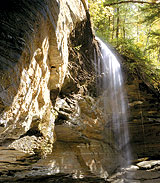
This waterfall in Pisgah National Forest is a geocache site featured in a UNCA photo exhibit by Margot Anne Kelley. Its coordinates: N35*18.402 W082*46.507.
|
Too often, it seems, technological innovations cut people off from the natural environment. But at least one gadget has sparked a renewed connection with the natural world: the GPS device, a primary instrument used in a relatively new outdoor hobby known as “geocaching.”
It’s best described as a high-tech treasure hunt. The journey begins by logging onto a Web site, downloading the coordinates of a planted cache and venturing out to uncover it with a handheld GPS. Using satellite signals, the device will lead you to the cache, a well-concealed waterproof container containing a logbook and any number of trinkets, toys, handwritten jokes or other random objects.
While the found goodies are free for the taking — as long as the discoverer leaves a gift in lieu of the items they’ve scored and records their visit in the logbook — the draw of this activity seems to be less about cracking open the canister and more the rush of anticipation at being led into new and unknown territory. Some caches are deposited in the hearts of urban centers, but many more are strategically stashed amid the treasures of natural landscapes, inviting forays into wild areas.
“In this era when people are increasingly disconnected from the land that surrounds them, geocaching offers a technologically savvy vision for the future that depends on walking and the personal exploration and discovery of our landscapes,” reads the inside jacket of Local Treasures: Geocaching Across America (Center for American Places, 2006), a compilation of photographs by Margot Anne Kelley. Photos from Kelley’s extensive geocaching expeditions are currently on display at UNC Asheville’s Blowers Gallery, and she’ll make an appearance at the closing reception at 4 p.m. on Thursday, Sept. 28, at the same location to discuss her work.
According to Kelley, geocaching “helps bolster conservation concerns and environmental concerns simply by creating opportunities for people to see land in a new way.” She recalls one geocache site in south Georgia’s Okeefenokee Swamp region that was littered with garbage. But the cache contained garbage bags so geocachers could start hauling the litter out. “That ethic has become such a part of geocaching that CITO [cache-in-trash-out] bags are in caches pretty often, and the weekend nearest to Earth Day each April, there are CITO events all over the world sponsored by geocachers who want to help clean up public lands.”
But while avid geocachers insist that the sport helps to rekindle a connection with the natural world, not everyone regards the activity as environmentally beneficial.
“When we’ve become aware of geocaches, we’ve said, remove them,” says Bob Wightman, a ranger at the Great Smoky Mountains National Park. Wightman explained that, under park regulations, caches are considered abandoned property or litter, making it a violation to place one. There’s also concern about potential damage done by the seekers. “People looking for caches are going to trample around and create an impact trying to locate it,” he says. “We’d be particularly concerned in an area that’s off-trail. A cache would concentrate use in that area.” This particular park is currently reviewing its special-use permit conditions, which Wightman says might be altered to allow geocaches under certain circumstances.
Marcia Keener, an analyst with the Office of Policy at the National Park Service, says the NPS has not officially banned geocaching but considers it “banned until permitted. Every park is different. You could have a breeding population of a somewhat rare species in the area where you’re geocaching. The point is that you don’t know what you’re dealing with until you’ve spoken with park staff.”
For more information, visit www.geocaching.com and www.toto.lib.unca.edu/exhibits/blowers/margotkelley.html.



Before you comment
The comments section is here to provide a platform for civil dialogue on the issues we face together as a local community. Xpress is committed to offering this platform for all voices, but when the tone of the discussion gets nasty or strays off topic, we believe many people choose not to participate. Xpress editors are determined to moderate comments to ensure a constructive interchange is maintained. All comments judged not to be in keeping with the spirit of civil discourse will be removed and repeat violators will be banned. See here for our terms of service. Thank you for being part of this effort to promote respectful discussion.